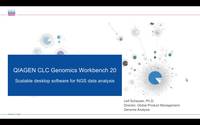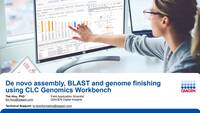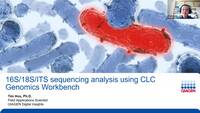QIAGEN CLC Genomics
Pathogen detection and variant analysis using hybrid capture technology and QIAGEN CLC Genomics Workbench
456 views
In this training, we'll use QIAGEN CLC Genomics Workbench to analyze NGS data generated from hybrid capture technology. Using data generated from QIAGEN HYB panels, you'll learn how to import, analyze and interpret NGS data. Specifically, you’ll discover:
1. How to import NGS data into QIAGEN CLC Genomics Workbench
2. How to analyze the data using template workflows;
3. How to interpret the results using the interactive graphics produced by the workflows;
4. How to modify the template workflows to accommodate custom panels
Related videos
QIAGEN CLC Genomics
QIAGEN CLC Genomics Workbench 20 – scalable desktop software for NGS data analysis
In this webinar, Leif Schauser, Ph.D., Director Product Management Genome...
QIAGEN CLC Genomics
De novo assembly, BLAST and genome finishing using QIAGEN CLC Genomics Workbench
This webinar will introduce users to the tools available for short reads...
QIAGEN CLC Genomics
16S/18S/ITS sequencing analysis using CLC Genomics Workbench
QIAGEN CLC Microbial Genomics Module provides tools and workflows for a broad...
QIAGEN CLC Genomics
Single-cell RNA-seq analysis made easy - February 24
Single-cell gene expression analysis starting from either FASTQ or expression...



